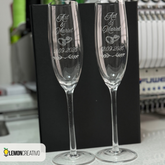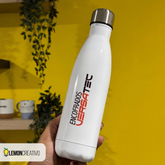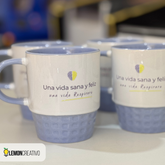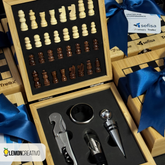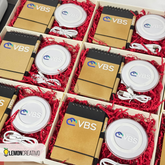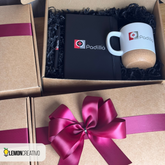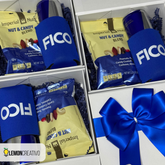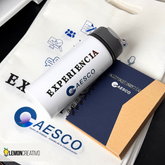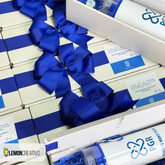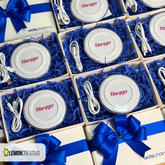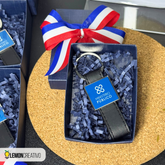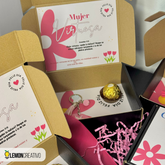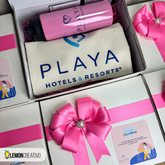7 steps to optimize sustainable corporate gifts in the Caribbean
SUSTAINABLE CORPORATE GIFTS CARIBBEAN
As a marketing or HR manager, your corporate gifting decisions have a direct impact on your employer brand, ESG (Environmental, Social, and Governance) compliance, and budget. This guide transforms SustainableCorporateGiftsCaribbean into a clear, measurable, and regionally efficient process for the Caribbean.
We'll address selection criteria, metrics, and logistics tailored to Caribbean islands and hubs, with a focus on traceability, customization, and real adoption by employees and customers. Lemon Creativo integrates design, curation, low-footprint printing, kitting, and regional compliance to execute consistently.
To contextualize the challenge, we share a brief anecdote that illustrates why choosing wisely avoids hidden costs and friction.
Six months ago, a hotel group purchased generic "green" items for an event. Forty percent of the items were left in storage due to lack of climate relevance and sizing; the perception of "greenwashing" escalated within internal networks. By refocusing purchases based on real-world usage and regional logistics criteria, the budget yielded 28% more, and adoption exceeded 80%.
Key recommendation: Align purpose, audience, and logistical context before defining the catalog.
To address this point, we recommend scaling the problem with concrete data and risks typical of the region.
Problem and impact
Poorly targeted budgets for sustainable gifts generate up to 12–18% in inefficient spending due to low adoption, duplication, and waste. In island contexts, logistics overruns and tariffs can add 10–20% if consolidation and scheduling are not planned. Furthermore, the inappropriate choice of materials compromises ESG objectives.
The disconnect between brand messaging and actual usage reduces the impact of gifting: the effective usage rate drops below 50% when the item is not integrated into local routines (beach, climate, mobility). At the same time, the fragmented transportation footprint increases emissions per unit; a consolidation strategy can reduce logistics CO₂e by 15–30%.
Finally, the lack of traceability and ethical sourcing exposes consumers to reputational risks. In supply chain audits, the absence of basic certifications limits sustainability reporting and hinders consistent narratives of eco-friendly corporate gifts and Caribbean business gifts.
Key recommendation: Quantify adoption, shrink, and CO₂e by channel before purchasing.
To address this point, we recommend structuring a corporate gifting strategy with clear operational steps and metrics.
Practical solutions
Step 1: Define objectives and KPIs (Key Performance Indicators). How to do it: Establish two to three expected outcomes (adoption, reputation, retention). Connect each gift to a milestone (onboarding, anniversary, event). What to measure: 30- to 90-day usage rate, internal brand NPS (Net Promoter Score), ROI (Return on Investment) per campaign.
Step 2: Select materials and certifications. How to do it: Prioritize materials with FSC (Forest Stewardship Council), GRS (Global Recycled Standard), and water-based inks. Avoid non-recyclable mixes. What to measure: % recycled/renewable material per item, estimated lifespan, traceable technical sheets.
-
Step 3: Caribbean logistics plan. How to do it: Consolidate shipments in regional hubs, prioritize suppliers with nearby stock and kitting options. Define import windows and sizing. What to measure: cost per delivery, door-to-door time, first-time delivery percentage, CO₂e per shipment.
Step 4: Useful and understated customization. How to do it: Branding in discreet, functional areas; add a card with a message and usage. Link it to wellness initiatives. What to measure: Public usage rate (photos at events), intranet mentions, QR code click-through rate to resources.
Step 5: Governance and compliance. How to do it: contracts with ethical sourcing clauses, chain of delivery records, and audits. What to measure: % of suppliers with current certification, incidents of noncompliance, and response times to withdrawals.
-
Step 6: Communication and experience. How to do it: Deliver with impactful storytelling and a care guide. Integrate a collection or repair plan. What to measure: post-delivery satisfaction rate, UGC (User Generated Content), replenishment vs. disposal rate.
Key recommendation: Turn every purchase into a mini-project with an owner, metrics, and a retrospective.
To address this point, we recommend illustrating with a case that reflects the potential for successful execution in the Caribbean.
Mini-case
Technology company with offices in the Dominican Republic and Puerto Rico. Objective: Increase adoption and reduce single-use plastics. Solution with Lemon Creativo: welcome kit with personalized stainless steel bottle, bamboo notebook, and recycled tote bag; regional kitting and consolidation of quarterly shipments.
Results in 6 months: 86% adoption; 72% reduction in single-use plastics in offices; 22% logistics savings through consolidation; internal NPS up 18 points; 2.8x ROI. Verified materials reporting and supplier data sheets for ESG audits.
Key recommendation: Consolidate purchases and standardize core kits to scale results.
To address this point, we recommend selecting an initial portfolio with high actual usage and regional availability.
Products recommended by Lemon Creativo
Eco Welcome Kit: Activates culture and accelerates onboarding; improves retention and NPS. /products/eco-welcome-kit
Personalized 500ml Stainless Steel Bottle: reduces waste and strengthens habits; impacts wellness programs. /products/500ml-stainless-steel-bottle
-
Bamboo Notebook with Recycled Pen: Everyday use and storytelling with renewable materials. /products/recycled-bamboo-notebook-pen
Key recommendation: Prioritize 2–3 SKUs with guaranteed replenishment and country variants.
To address this point, we recommend resolving common operational questions before starting the process.
FAQ
Q: What is the recommended budget per contributor in the Caribbean? A: Between USD 25–55 for onboarding and USD 15–30 for events, depending on the level and customization. Set caps per campaign and consolidate purchases.
Q: Typical delivery times per island? A: 7–15 days with regional stock and 20–35 days with custom manufacturing. Quarterly consolidation reduces risks and costs.
-
Q: How can I verify that the gift is truly sustainable? A: Request technical data sheets, certifications (FSC/GRS), percentage of recycled material, and an estimated CO₂e per unit. Integrate this data into your ESG report.
Key recommendation: Document every decision (materials, certifications, logistics) for audits and communication.
To address this point, we recommend closing with a streamlined and measurable quote process with Lemon Creativo.
At Lemon Creativo, we coordinate design, curation, customization, kitting, and regional logistics for sustainable merchandising with an impact report. We deliver proposals within 48 hours and samples upon request.
Request your quote and samples within 48 hours.
Key Recommendation: Define your quarterly calendar today and start with a pilot kit.


